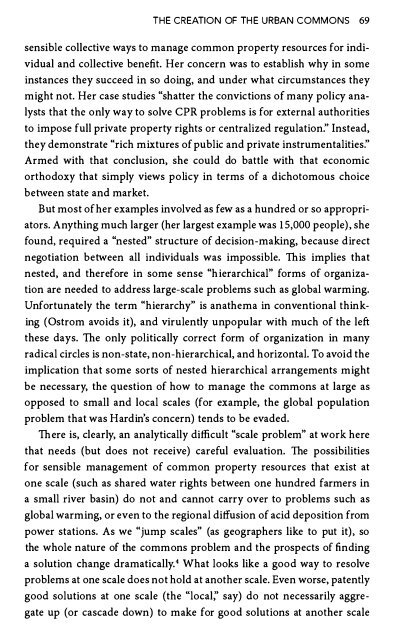Rebel Cities-David Harvey
Rebel Cities-David Harvey
Rebel Cities-David Harvey
- No tags were found...
You also want an ePaper? Increase the reach of your titles
YUMPU automatically turns print PDFs into web optimized ePapers that Google loves.
THE CREATION OF THE URBAN COMMONS 69sensible collective ways to manage common property resources for individualand collective benefit. Her concern was to establish why in someinstances they succeed in so doing, and under what circumstances theymight not. Her case studies "shatter the convictions of many policy analyststhat the only way to solve CPR problems is for external authoritiesto impose full private property rights or centralized regulation:' Instead,they demonstrate "rich mixtures of public and private instrumentalities:'Armed with that conclusion, she could do battle with that economicorthodoxy that simply views policy in terms of a dichotomous choicebetvveen state and market.But most of her examples involved as few as a hundred or so appropriators.Anything much larger (her largest example was 15,000 people), shefound, required a "nested" structure of decision-making, because directnegotiation between all individuals was impossible. This implies thatnested, and therefore in some sense "hierarchical" forms of organizationare needed to address large-scale problems such as global warming.Unfortunately the term "hierarchy" is anathema in conventional thinking(Ostrom avoids it), and virulently unpopular with much of the leftthese days. The only politically correct form of organization in manyradical circles is non-state, non-hierarchical, and horizontal. To avoid theimplication that some sorts of nested hierarchical arrangements mightbe necessary, the question of how to manage the commons at large asopposed to small and local scales (for example, the global populationproblem that was Hardin's concern) tends to be evaded.There is, dearly, an analytically difficult "scale problem" at work herethat needs (but does not receive) careful evaluation. The possibilitiesfor sensible management of common property resources that exist atone scale (such as shared water rights between one hundred farmers ina small river basin) do not and cannot carry over to problems such asglobal warming, or even to the regional diffusion of acid deposition frompower stations. As we "jump scales" (as geographers like to put it), sothe whole nature of the commons problem and the prospects of findinga solution change dramatically.4 What looks like a good way to resolveproblems at one scale does not hold at another scale. Even worse, patentlygood solutions at one scale (the "local;' say) do not necessarily aggregateup (or cascade down) to make for good solutions at another scale


